
Viz World User Guide
Version 17.0 | Published January 24, 2018 ©
3D Map Setting Plugin
![]()
The plugin can be found in the folder: Viz Artist 3: Built Ins -> Scene Plugins -> Maps.
The 3DMapSetting plugin is a scene plugin used for managing border data from the server. The border data is retrieved from the Viz World Server (WoS), according to the setting in the 3DMapSetting plugin, and is used for applying a graphic design to the borders in the map, drawn by the 2D Label plugins.
This section contains information on the 3DMapSetting plugin properties:
General
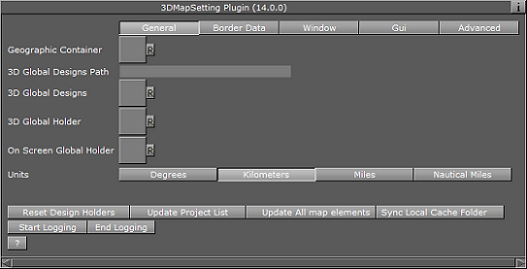
-
Geographic Container: Draws the border of the selected map. Drag the CWMClient container that defines the map area to the container place holder.
-
3D Global Designs Path: Sets the path to a Viz folder containing the global designs.
-
3D Global Designs: Drag the global designs container to the container place holder.
-
3D Global Holder: Defines the container that will hold all the global 3D objects created from the global designs.
-
On Screen Global Holder: Defines the container that will hold all of the On-Screen global 3D objects created from the global designs.
-
Units: Defines the type of units used to measure how many degrees, kilometers, miles or nautical miles you see. The selection you make here will affect your Navigator’s Height Units setting and the label appearance Units in the Label Manager plugin (see Definitions).
Border Data
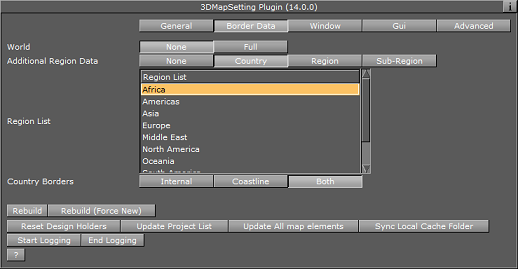
-
World: Defines whether the border data will be fetched for the entire world (country borders) or other data as defined in the Additional Region Data parameter.
-
None: Retrieves the border data as defined in the Additional Region Data parameter.
-
Full: Retrieves the country borders data for the entire world (country borders only).
-
-
Additional Region Data: Defines additional border data that will be retrieved from the server with the data defined in the World parameter. The additional data will be limited to the selected region in the Region List parameter.
-
None: No additional data will be used.
-
Country: Country borders data in the selected region area will be used.
-
Region: Region borders data in the selected region area will be used.
-
Sub-Region: Sub-Region borders data in the selected region area will be used.
-
-
Region List: Defines an area of the world for which the additional region data will be retrieved from the server. The parameter limits the data size retrieved from the server.
-
Country Borders: Will create country borders for the selected region in the region list property.
-
Rebuild: Retrieves the information from the Viz World Server (WoS).
-
Rebuild (Force New): Recreates the data on the Viz World Server (WoS) and saves it to the cache folder, even if cached data already exists.
Window
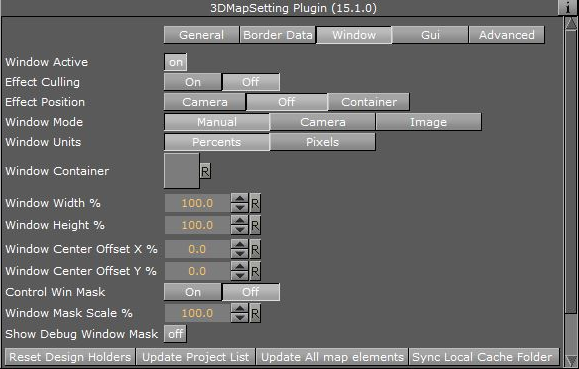
-
Window Active: Enables the user to define an area in the renderer as an active window. All maps data created by the Viz World Client will be redrawn to fit into the defined window. When set to ON additional parameters will be enabled:
-
Effect Culling: Defines whether the window will effect the culling of the vector data (streets, borders, etc.).
-
Effect Position: Allows you to offset the map either by (1) Using the window width & height and window center X & Y properties, or (2) By turning ON container mode and dragging a container to the Window Container parameter, which will be used to track the size and position for offsetting the map camera
-
Effect Camera: This is useful when you want to avoid labels in a specific area of the map. By default, the Window settings effect the cameras aswell. If not a window will be created and will be used my many plugins (mainly labels) but the actual cameras will not be shifted.
-
Window Mode: Defines the source of the window aspect: Manual sets the window aspect to be user defined, Camera sets the window aspect to be the same as the render window, and Image sets the window aspect to be the same as the image aspect of the map.
-
Window Units: Defines the units used to set the window size and position. When set to Percents, the window size will be calculated as the defined percentage of the Viz render window size. The window position will be calculated as the defined offset percentage of the render window.
-
Window Container: Allows tracking a container from the scene tree that will affect the size and position of the window.
-
Window Width: Defines the width of the window in percents or pixels.
-
Window Height: Defines the height of the window in percents or pixels. This parameter is enabled only if window mode is set to Manual.
-
Window Center Offset X: Defines the X position (percents or pixels) of the window in relation to the render window (center to center).
-
Window Center Offset Y: Defines the Y position (percents or pixels) of the window in relation to the render window (center to center).
-
Control Win Mask: Defines whether a WindowMask plugin (added to the map) will be controlled by the 3DMapSettings plugin to mask the defined window or not.
-
Window Mask Scale: Defines the scale of the mask over the defined window.
-
Show Debug Window Mask: When enabled (on), a red rectangle around the defined window will be displayed.
-
GUI
GUI defines general parameters for controlling container names and container colors in the Viz GUI (effecting the Viz scene tree display), and the creation of Control Channels from added Viz World Client objects. The Control Channels in Viz are displayed under the Control tab and serve as an index for the scene tree. For additional information about Control Channels please refer to the Viz Artist user guide.
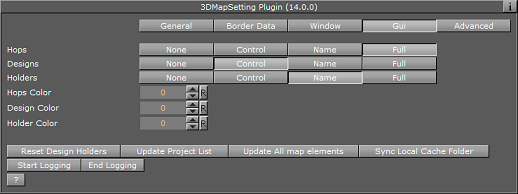
-
Hops: Defines GUI parameters for hop containers in the scene tree:
-
None: No control channel or name conversion will be applied to the hop containers.
-
Control: Only a control channel will be added for the hop containers.
-
Name: The created hop containers will be named Hop-1, Hop-2, etc., according to the hop point selected in the NavFinder plugin. No control channel will be added.
-
Full: A control channel will be added for every hop container and the hop containers will be renamed Hop1, Hop2, etc.
-
-
Designs: Defines GUI parameters for any design containers (region designs, road designs, label designs, and so on) in the scene tree:
-
None: No control channel or name conversion will be applied to the design containers.
-
Control: Only a control channel will be added for the design containers used in the scene. The containers will not be renamed.
-
Name: The design containers (dragged to the CWMClient plugin) will be renamed Label-Designs, Region-Designs, and so on. No control channel will be added.
-
Full: A control channel will be added for every design container and the design containers will be renamed.
-
-
Holders: Defines GUI parameters for any object holder containers (regions, roads, labels , and so on) in the scene tree:
-
None: No control channel or name conversion will be applied to the holder containers.
-
Control: Only a control channel will be added for the holder containers used in the scene. The containers will not be renamed.
-
Name: The holder containers (dragged to the CWMClient plugin) will be renamed Label-Holder, Region-Holder, and so on. No control channel will be added. If the holder container is dragged to a hop CWMClient, it will be named with a suffix indicating the hop number: Label-Holder-H1, Label-Holder-H2, and so on.
-
Full: A control channel will be added for every design container and the Holder containers will be renamed.
-
-
Hops Color: Sets the color index, as defined in the User Interface parameter in Viz Config (Viz 3 only), that will be used for the Hop containers in the scene tree.
-
Design Color: Sets the color index, as defined in the User Interface parameter in Viz Config (Viz 3 ONLY), that will be used for the design containers in the scene tree.
-
Holder Color: Sets the color index, as defined in the User Interface parameter in Viz Config (Viz 3 ONLY), that will be used for the generated objects holder container in the scene tree.
Advanced
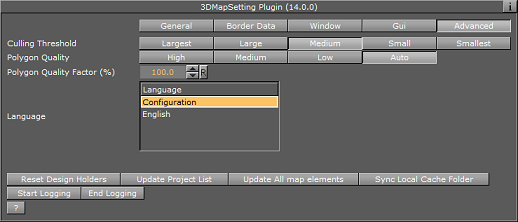
-
Culling Threshold: Sets the size of polygons to be culled (not rendered). It is generally better to cull small polygons as they may not look good when rendered.
-
Polygon Quality: Defines the quality of the drawn border lines. The higher the quality the smoother the line will be.
-
Polygon Quality Factor (%): Enables the user to change the automatic polygon quality levels by setting a factor that will change the border quality. Values under 100% will decrease the quality of the lines. Values above 100% will increase the quality of the lines.
-
Language: Allows the user to set the language of labels for the scene. For information on how to configure multi-language see Map Name Editor.
Tip: For more information about Viz Config and its configuration options, see the Viz Engine Administrator’s Guide.
Buttons
-
Reset Design Holders: Cleans up all design holders (labels, regions, borders and so on).
-
Update Project List: Updates the list of Viz World map projects available to the designer. By default Viz Artist always checks the Viz World Server for a list of projects and if a a scene is opened and its project does not exist an error message is displayed. However, if a project is added after Viz Artist is started you can click the Update Project List button in order to update Viz Artist and to avoid the error message.
-
Update All Map Elements: Checks all map elements in the scene (CWM clients, Place finder and so on) and refresh them.
-
Sync Local Cache Folders: Synchronizes the local cache folder with the primary cache folder. For more information see Maps Configuration.
-
Start Logging: Option to log all map related activities into a file.
-
End Logging: When you press the End Logging button, the log file will be saved under C:\Program Files (x86)\vizrt\Common\Maps\logs.